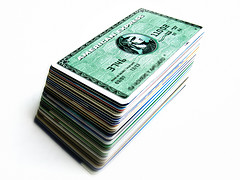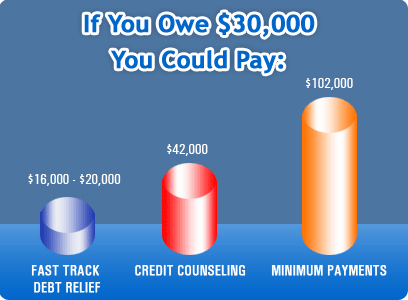Improve Your Credit Score
When many people think of credit reports and credit scores, they see them as important if you want to apply for a loan. And of course they are important when you apply for a loan. But your credit report and score are also absolutely critical to getting rid of debt. With a good credit score, you qualify for lower interest rates that can help bring down your total interest charges. With bad credit, you’re stuck paying double digit rates. So let’s look at some tips and tools that can help you:

-
Understand the Importance of Your Credit Score: As noted above, your credit score is an important tool in getting out of debt as quickly as possible. To underscore this, check out these stats from myfico.com for individuals with a FICO score of 660 (fair credit) versus 760 (excellent credit):
-
Mortgage: The average interest on a home loan today is about 4.766% for excellent credit, but 5.379% for fair credit.
-
Car Loan: With a credit score of 760, you can expect a car loan interest rate of about 6.3%. With a score of 660, the rate increases to about 9.8%.
-
Home Equity: Excellent credit can expect a rate of around 8% or lower, while fair credit borrowers will pay as much as 11% or higher.
-
- Get your Free Credit Report: The starting point is to get your free credit report and check it for errors.
- Get your Free Credit Score: Next you should get your free FICO score. You can’t get this from annualcreditreport.com, but there are several sources that offer your real FICO score in exchange for signing up for a free trial of a credit watch program. You can always cancel before the end of the free trial if you don’t want to keep the service.
- Pay Your Bills on Time: There are a number of factors that go into a credit score, but one of the most important is paying your bills on time. Do whatever is necessary not to forget a payment, and make sure you make the payment far enough in advance of the due date so that there is no chance it will be late.
- Don’t Close Accounts: As a general rule, don’t close credit card and other revolving accounts. One of the factors in determining credit score is the amount of debt you have in comparison to the amount of available credit. The greater the available credit, the better. You can always cut up some of your cards if you don’t want to risk using them, but don’t cancel them. Here are some other tips to improving your credit score.
phot by: Horia Varlan









 Some great New Credit Card Rules were passed last year. Here's what you need to know:
Some great New Credit Card Rules were passed last year. Here's what you need to know:


 What is a 1099-C?
What is a 1099-C? Dealing with Debt
Dealing with Debt
 Last week I discused the first two parts to getting out of debt FAST!
Last week I discused the first two parts to getting out of debt FAST!


